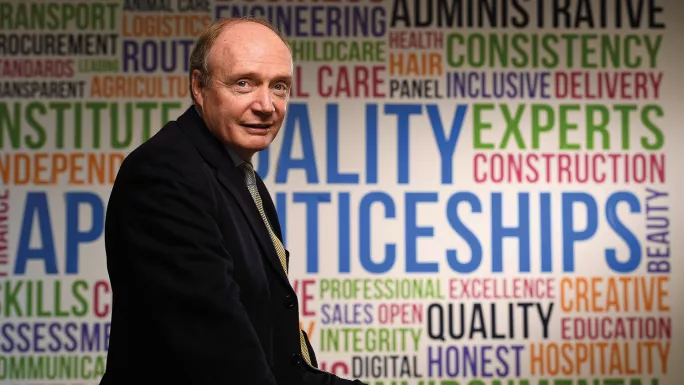‘Apprenticeship reforms put the onus back on employers’

It is difficult to miss the gleam from Sir Gerry Berragan’s expertly polished shoes as light streams in through the floor to ceiling windows of the Institute for Apprenticeships offices.
“It’s a skill that never leaves you,” he insists. Though this is hardly surprising from a man who dedicated 36 years of his life to the army.
It was a career that took him to places “too numerous to mention”, where he rose through the ranks to become the army’s last ever adjutant-general - a 250-year-old post that made him one of the most high-ranking officials in the armed forces, in charge of its personnel policy.
“I’ve never been someone who is entirely motivated by money,” he says. “I’ve always wanted to be doing something that has a greater benefit for the nation. For most of my life, I’ve defended the nation’s interests. Now I’m interested in trying to help make the skills shortfall better and to improve productivity in the country.”
In keeping with that spirit, Berragan joined the fledgling Institute for Apprenticeships just under a year ago. “As I left the army I was looking for ways in which I could still contribute to the nation. I’ve always been a public servant - it is always something that has been important to me.”
Rules of engagement
After serving on its founding board, Berragan became the institute’s first permanent chief executive last November - taking over from Peter Lauener, who held the post on an interim basis.
Berragan was involved in training at every level of the army. During his time as director general of recruiting and training, he also acted as an apprenticeships ambassador. The army has a long history of offering apprenticeships and Berragan points to the fact his father and uncle both started their careers at the army apprentices colleges in the 1940s.
“For me, training was second nature. It was something you did when people joined the army. I think a lot of businesses have lost that art,” he says. “These apprenticeship reforms are putting the onus back on employers to recognise that they can’t expect the schools system, or society, to somehow generate the skills they need. They have a responsibility to do it themselves.”
He adds: “From my perspective, these reforms are very much about getting employers re-engaged in identifying what skills they need - and to help us to develop apprenticeships that meet those skills needs.

“The levy is an incentive for them to do it. Because if they didn’t have to, why would they? If they could go out to the marketplace and just buy these skills in. That wasn’t working. They had these skills gaps, they couldn’t recruit and they were saying to the government, ‘We’ve got a problem.’”
The benefits of apprenticeships, particularly in terms of social mobility, are clear for Berragan. He has seen first-hand the way quality training can transform lives.
“Certainly something that struck me in my time in the army was the soldiers who came to us who had not been successful in school. It was often because they couldn’t see the relevance of what they were learning in school to their later life. Once they came into the army they could see the training they were doing directly impacted on their job and their ability to succeed in that job,” he says.
“People are much more willing to commit to learning if they can see an imperative to do it because their job and their future prospects depend on it. That’s what really brings it home to me. It becomes more real when the training is about what you’re doing or what you’re going to do than if it’s something theoretical.”
The military has formed an integral part of Berragan’s upbringing. Growing up with a father in active service gave him a “very different” childhood, during which he moved all over the world.
“I grew up in Hong Kong, Malaya [now Malaysia], Germany,” he says. “I moved house almost every two or three years. Changed schools and did all of that.
“I thought it was a fascinating childhood and I wouldn’t have missed it for the world. I had a huge variety of experiences. You had to make friends quickly and adapt quickly, but those are skills that I think stood me in good stead for the rest of my life.”
Despite being the fourth generation of his family to serve, joining the army was not an inevitability.
“I hadn’t made my mind up to join the army until quite late,” he adds. “When I finished my A levels I was looking around and tried a range of different things, but none of them scratched the itch for adventure. So I was looking for adventure and I realised that I wanted some responsibility and the one thing I knew would give me that was the military.”
His two sons, who work in the digital sector, did not follow in their father’s footsteps, however. “They both did cadets and University Officers’ Training Corps. They certainly got involved, but both saw for their own particular strengths the digital economy offered them more opportunities.”
It could all have been very different for Berragan, though, had the reformed apprenticeship system been around when he finished school. “I did once want to be an architect. Perhaps if there had been the architectural apprenticeship route 40 years ago, then maybe I would have gone down that route instead.”
You need a Tes subscription to read this article
Subscribe now to read this article and get other subscriber-only content:
- Unlimited access to all Tes magazine content
- Exclusive subscriber-only stories
- Award-winning email newsletters
Already a subscriber? Log in
You need a subscription to read this article
Subscribe now to read this article and get other subscriber-only content, including:
- Unlimited access to all Tes magazine content
- Exclusive subscriber-only stories
- Award-winning email newsletters